In China, more young people are returning to live with their parents in their 20s when they might be expected to be buying a house and starting their own lives. Is this just another form of rebellion for young people who have had enough of China’s demanding work culture and high-pressure lifestyle?
At around 9 in the evening, Fan Ying, dragging her weary body, steps out of the office building of NetEase Games in Shenzhen, one of China’s leading internet and gaming companies. She has just finished her work for the day, utterly drained. Half the building is still brightly lit, with her colleagues still hard at work.
After hours of sitting in front of her computer since 9:30 in the morning, her mind and body are barely functioning. All she wants now is to get home as quickly as possible, shed this empty shell of exhaustion and finally get some much-needed rest.
“Overtime was a routine,” says Ying, “Once, I was busy with a newly launched game project. I worked almost continuously for 72 hours before I finally got a good sleep.”
Ying, overwhelmed by relentless overwork and health problems, felt despair and realised she couldn’t manage life in a large city. She left her job and moved back to her less-developed hometown in northeastern China.
Tired Chinese employees are frustrated with their demanding schedules. The 996 work schedule, which means working from 9am to 9pm, six days a week, is common in a wide range of sectors in China, especially in the tech industry.

Many of these young adults are burned out and are returning to their family homes, where their parents hire them as “full-time children”. They earn a salary by doing household chores, running errands and caring for young or elderly relatives. Ying is one of the full-time children.
A group titled “Full-time Children’s Work Communication Centre” boasts over 4,800 members on Douban, a popular Chinese internet forum. The hashtag “full-time children” has garnered over 4 million views on Xiaohongshu, China’s Instagram.
Young people not only have to work long hours but also face pressure from performance reviews. According to Ying, her company uses an A, B and C grading system, and if you keep getting a C, you might get fired. “I feel that the goals set by the leader are impossible for me to achieve,” she says.
Ying describes herself as a donkey trapped in the office building. “Harnessed donkeys walk endlessly around the millstone to produce flour. When I put on my work badge, I feel like a donkey being harnessed and put to work,” she says. “After the beep of the card reader as I enter the building, I become the donkey.”
Ying’s health deteriorated after working for four years in two demanding positions in Shenzhen. “I worked overtime more often, and the performance targets became more challenging. I suffered a heart attack,” she says. “I had to undergo heart and kidney surgeries. Now, my left kidney no longer functions.”
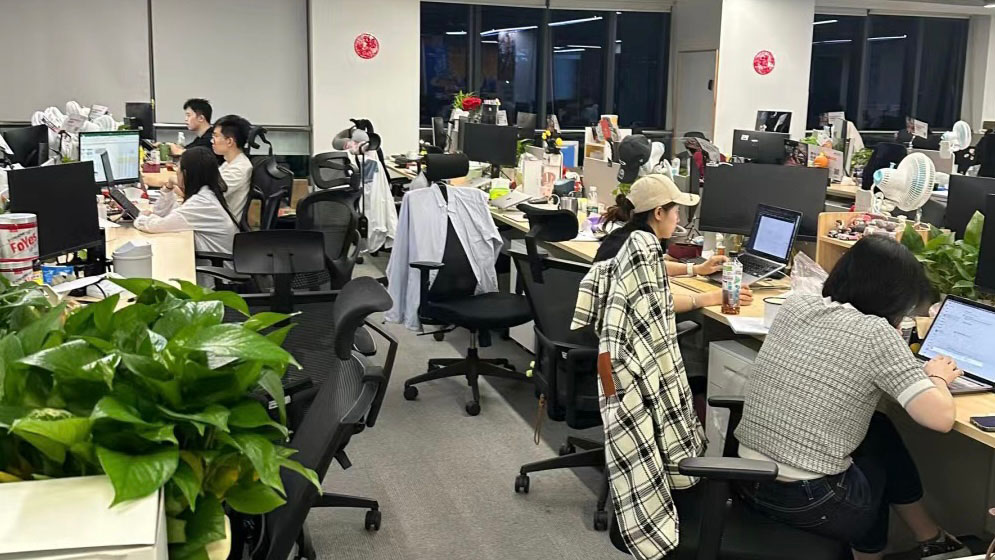
She has also been mentally overwhelmed by the pressure and has suffered from bipolar disorder. People with bipolar disorder experience extreme emotional ups and downs, ranging from mania to depression.
According to a government mental health survey, nearly one in four of China’s young people are facing mental health problems.
Ying had to give up on striving in the city she once dreamed of. “I came to Shenzhen after graduation. I hoped to buy a house and settle down here,” Ying says. She earned a good income and bought a small house, but eventually, she lost everything. She had to sell the house to pay for her surgeries.
Her dream of building a life in the big city was illusioned. She says, “In the end, all the money I earned was spent on medical treatments. I felt like I ended up back where I started, or even worse.” She couldn’t see any opportunity for upward mobility.
When I put on my work badge, I feel like a donkey being harnessed and put to work
Like Ying, many young Chinese dream of getting into university, landing a good job in a large city and settling into the urban middle class. But now, more are realising that these dreams may never become a reality.
Young people today find it harder to achieve success compared to their parents. Feng He, a recent graduate from Zhengzhou University, an elite institution in central China, says, “My dad’s generation benefited from the opportunities in the early stage of China’s reform and opening-up period a few decades ago. Despite dropping out of middle school, he started a business, earned money and greatly improved his living standards.”
George Magnus, a research associate at the University of Oxford’s China Centre, says that their parents’ generation benefited from the economic and productivity boom that’s no more in China.
Even though He graduated from an elite university and will pursue a master’s degree this September, he isn’t optimistic about his future despite his excellent qualifications. “I feel like our parents’ ten years of hard work were much more effective than ours, and their income levels were much higher than what we can achieve now,” he says.
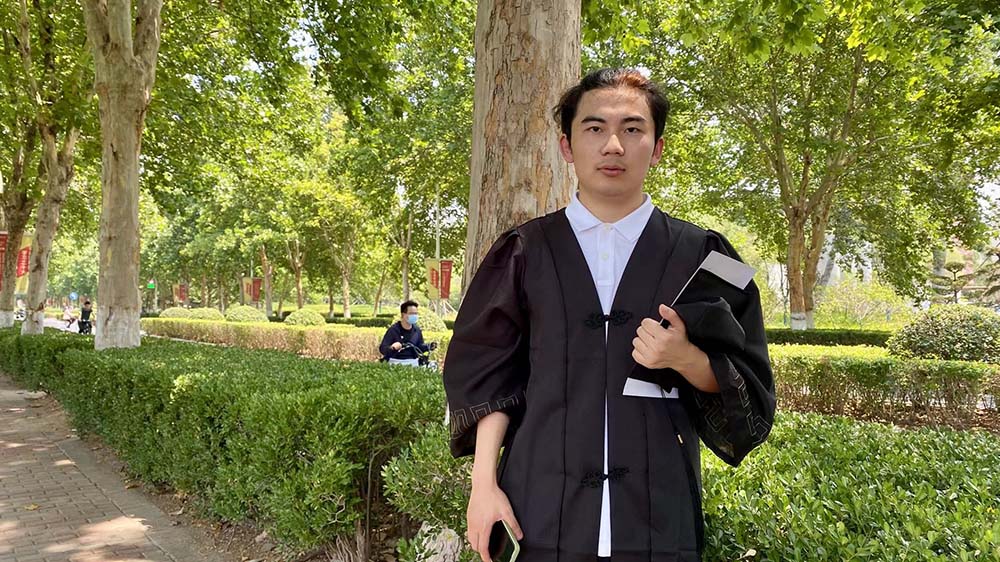
Lauren Johnston, an Associate Professor at the University of Sydney’s China Studies Centre, notes that achieving conventional success, such as buying a house, is hard for today’s young people in China. She says, “Back then, housing was public or newly privatised and was not many multiples of their income when they bought. Today, it is many many times the average income.”
China’s middle-income families in 2023 would need 33 years of disposable income to afford a standard 90-square-metre apartment, according to Numbeo, a global database of living costs.
The rise of “full-time children” is adjacent to other popular trends among Chinese young people, such as “lying flat” and “touching fish”. “Lying flat” means rejecting societal pressure and embracing a relaxed life. As overwork culture intensifies and class structures harden, many young Chinese are feeling burnt out and opting out of the rat race.
George views “lying flat” as a response by Chinese young people to tough realities. He says, “Younger people seem to lack confidence in the future and perhaps even in their own government, especially after Covid.”

Being full-time children and “lying flat” appear to be quiet rebellions by young people against the high-pressure lifestyle and overwork culture, due to the repression and internal control over protest and dissent in China, according to George. “It’s not like Chinese people are naturally quiescent or unfamiliar with protest but the environment of surveillance and control is a big bulwark,” he says.
Ying, who views her “lying flat” as an act of defiance, says, “Hard work hasn’t paid off. I no longer believe that life will get better, so I’m just staying idle.”
However, for some, “lying flat” is less about rebellion and more about following their hearts and pursuing a lifestyle they enjoy. Lu Di feels this way. She is a full-time daughter and embraces the “lying flat” trend because she simply couldn’t tolerate her previous job that demanded constant overtime.
https://www.youtube.com/watch?v=Mzx0ABuXQL4&t=4s
When Di graduated from university in 2023, she was thrilled to receive a job offer from a top company in her industry. “I didn’t want to rely on my parents anymore,” she says. “I dreamed of becoming like those successful women in TV dramas who move up the social ladder through their careers.”
Her expectations were soon shattered. Di often worked from 8:30 in the morning until 9:30 at night and had to complete tasks that her colleagues left unfinished during the day when working overtime. “My overtime felt pointless,” she says. “I was just a cog in the machine, doing work that wasn’t meaningful or important.”
Feeling overwhelmed and unsatisfied, Di gave up her job after three months and moved back to her family home. “Before I started, I even told my friends that this was my dream job,” Di says. “But after I began, I realised it wasn’t good. This job didn’t allow me to achieve a work-life balance. I couldn’t accept it. So, I decided to return home and ‘lie flat’.”
Like Di, today’s Chinese young people are increasingly impatient with their jobs. According to a report from LinkedIn, Chinese young people born after 1995 spend an average of just seven months in their first job. The length of time young people stay in their first job is also decreasing with each generation.
Those born in the 1970s stayed in their first job for four years. This dropped to three and a half years for those born in the 1980s, 19 months for the post-1990 generation, and now just seven months for those born after 1995.
Compared to older generations, today’s young people are less willing to endure unsatisfying jobs and are more likely to quit because they care more about their well-being and seek to realise their own values.

Chinese young people value their feelings and believe it is acceptable to “lie flat”. Zhang Xiaoying, who embraces “lying flat” after feeling weary and frustrated during university, says, “I think life shouldn’t always be about studying or working. There should be time to rest.”
Today’s young people have grown up in high-pressure environments, whether in university or the workplace. Many graduates want to “lie flat” and take a break after graduation. Xiaoying says, “Our tutors constantly pushed us to participate in various conferences and competitions at university. Every time I filled out the registration forms, I felt overwhelmed. I wanted to escape the relentless pace.”
Xiaoying became a full-time daughter and moved in with her grandparents after graduating. She enjoys the cosy and relaxing life there. Xiaoying starts her mornings with yoga, then savours coffee she brews herself, daydreams at the edge of the field in the afternoon and winds down her evenings with leisurely walks alongside her grandparents and their lovely dog.
Young people find “lying flat” saves them from a high-pressure lifestyle and gives them time to discover themselves. Di says, “For the past decade, I was always under pressure from school and exams. I never had the opportunity to relax. I didn’t even know what my hobbies were. But after moving back home, I started to get to know myself better and found a passion for new things.”
Di slips on her headphones and mounts her bicycle after dinner. As she pedals into the evening, she enjoys the gentle breeze and the melodies she loves. “Now, I enjoy hiking, cycling and playing mobile games. I’ve finally found what I’m really interested in,” she says.
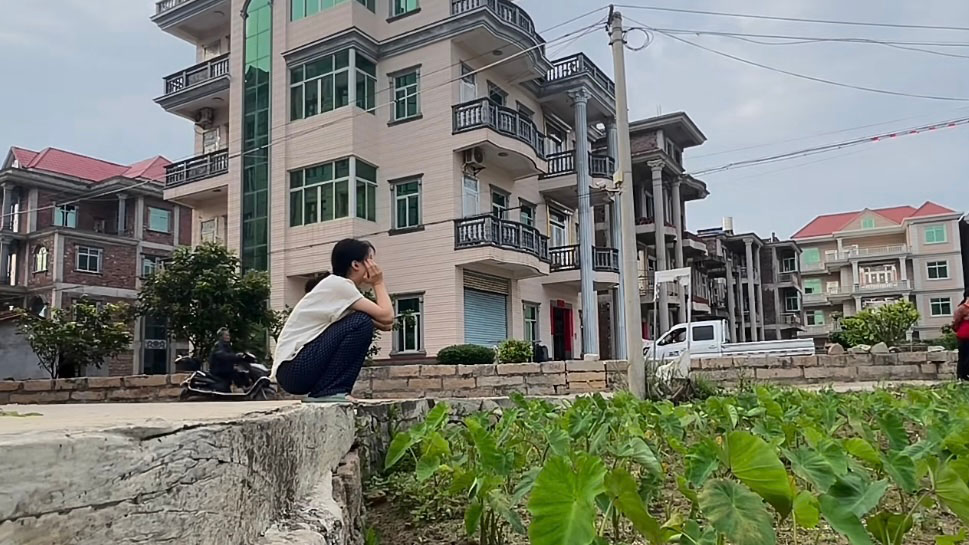
Di felt guilty at first about not having a job and “lying flat” as she feared her life would go off track and she would fall behind her peers. But when she learned that many of her classmates who had worked for a year after graduation had quit or been made redundant, she felt better. “I realised that even if I had kept working back then, I probably would have ended up quitting by now as well,” Di says.
Demanding jobs with overtime are pushing some young people towards low-stress careers, even those with lower salaries and less prestige. Under pressure from her parents, Xiaoying has had to start job hunting. Although she can’t fully embrace the “lying flat” lifestyle, she is considering less-demanding roles.
“I’m quite worried about overtime. Although I’ve never worked in a company, from what I’ve heard, I’m averse to that kind of working atmosphere,” Xiaoying says. “I’m worried it may affect my quality of life. I’m afraid I won’t have time for the gym or exercise.”
Xiaoying, who graduated with a degree in accounting, is thinking about jobs unrelated to her field, such as working as a barista in a café. She is not concerned about the income. “I think as long as I can support myself, that’s enough,” she says.
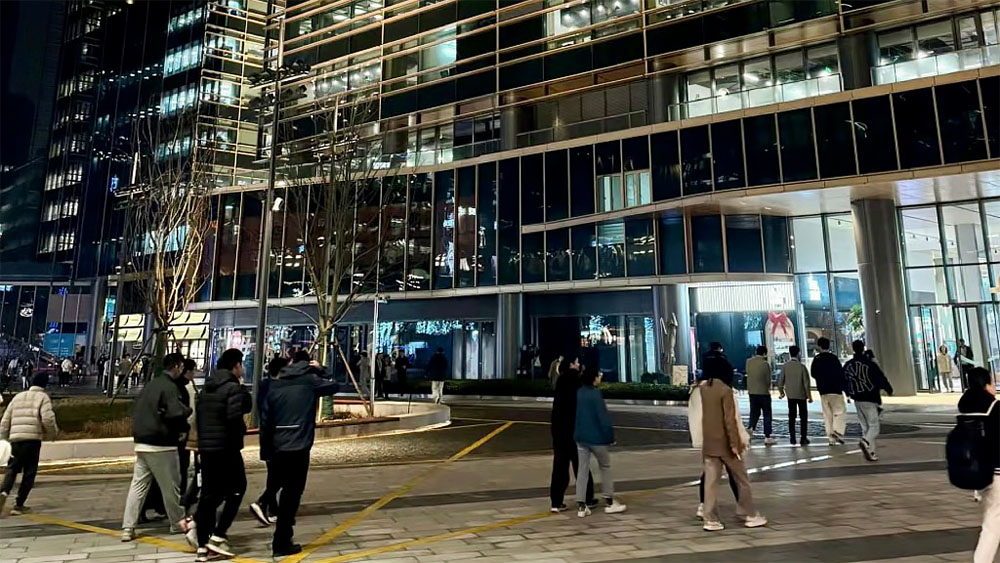
Young Chinese people are pushing back against the culture of overwork by embracing a trend known as “touching fish”, which means slacking off during work hours. The term comes from a Chinese proverb, “muddy waters make it easier to catch fish”. It describes the act of young employees finding clever ways to take breaks during their long workdays.
Some young people have shared their “touching fish” tactics on social media. They take frequent and long toilet breaks, chat with friends online while the sound of typing gives the illusion of productivity, and pretend to be on important calls just to step outside for some fresh air. Some even repeatedly refill their water bottles as an excuse to leave their desks.
Many young employees choose to do the bare minimum and hold back from giving their best effort at work because they are unhappy with their salaries and see no opportunities for promotion. Some aren’t even interested in pursuing career advancement at all.
Liu Jie, whose job involves producing TikTok content for AI-generated social networking products, appears focused on sifting through foreign animations for the video material needed in her work task. Her eyes are glued to the screen as she clicks through videos. But in fact, she’s watching her favourite animation.
Jie pretends to be busy because she doesn’t want to take on more work. “The videos I need to find and the ones I like are both foreign animations, so my supervisor usually can’t tell that I’m slacking off,” Jie says. “I want my supervisor to think my workload is full. I don’t want him to assign me more tasks.”
I want my supervisor to think my workload is full. I don’t want him to assign me more tasks.
Chinese official media have been condemning the “lying flat” movement. Nanfang Daily, an official outlet, wrote in a commentary that “lying flat” is shameful and only hard work brings happiness. While the article recognised the pressures young Chinese people face, it emphasised the need to maintain a confident and positive attitude.
President Xi Jinping holds high expectations for young Chinese. On the eve of China’s Youth Day in May, Xi once again sent messages to the country’s young people, calling on them to shoulder the responsibility for China’s development.
He asked young Chinese to have ideals, assume responsibility, work hard and endure hardship to contribute to building China into a strong country and promoting the great cause of national rejuvenation.
Many young people remain unenthused despite President Xi’s calls. Zhao Wenya, a recent graduate who is frustrated with a life full of pressure, says, “We kind of just let it go. The country can promote what it wants, I prefer to focus on myself and live happily and in the moment.”
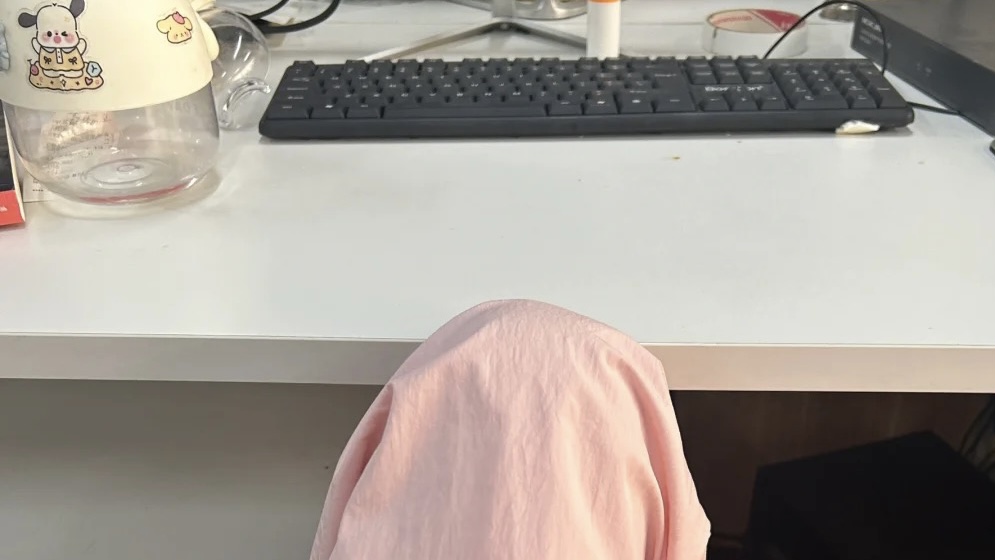
Mok Ka-Ho, a professor from Lingnan University, believes that “lying flat” is acceptable. He says, “A society calling for modernisation would see a lot of diversity.”
Di has been staying at home for more than a year and has no plans to seek a job. She says, “I know that being a full-time child might affect my chances of finding a job in the future, but at the moment, it feels great to “lie flat”. I don’t want to strive for success anymore.”